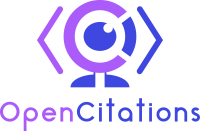Why OpenCitations?
Since its foundation in 2010, OpenCitations has been established as a community-guided open infrastructure to provide access to global scholarly bibliographic and citation data, with the mission of harvest and openly publish accurate and comprehensive metadata describing the world’s academic publications and the scholarly citations that link them, and to preserve ongoing access to this information by secure archiving.
OpenCitations:
- provides an enduring source of comprehensive high-quality scholarly bibliographic and citation metadata
- enables integration with complementary sources of open scholarly information;
- provides information, both in human-readable form and in interoperable machine-readable Linked Open Data formats;
- is a disruptive and free alternative to proprietary citation services;
- shares the values of Open Science;
- its data is published under a Creative Commons CC0 Public Domain Waiver, and may be freely reused for any purpose, including commercial purposes.
A citation is a conceptual directional link between a citing entity and a cited entity which is defined by means of specific textual devices contained in the text of the citing entity, e.g. a bibliographic reference denoted by an in-text reference pointer. While reasons for citing may vary, citations are used in academia for acknowledging others’ work and enabling building trails of relations defining how science evolves in time. In this way, scholarly communication involves the flow of information and ideas through the citation network. Such information is central to scholarly endeavour.
The open availability of bibliographic citation data is a crucial requirement for the bibliometrics and scientometrics domain for the creation of reproducible metrics for research assessment exercises.
In a 2013 article, OpenCitations’ director David Shotton defined as a “scandal” the fact that references lists from journal articles are not readily and freely available to use for all scholars. The difficult access to citation data is part of the so-called “Replication Crisis”, “an ongoing methodological crisis in which it has been found that many scientific studies are difficult or impossible to replicate or reproduce”(from Wikipedia.org). In this discouraging picture, in which research assessment is affected by an overall lack of transparency of the methods in use, the scholarly community has to strive to put to commons data that cannot be copyrighted, such as citations.
There are other open sources of scholarly bibliographic information and of reference lists from which citations can be inferred, including Crossref, DataCite, the NIH Open Citations Collection, OpenAlex, CiteSeerX, OpenAIRE, the Open Ukrainian Citation Index, Wikidata and Europe PubMed Central. However, OpenCitations is unique among them in having numerous beneficial characteristics regarding its data, its governance and its technical apparatus, as presented in the document The Uniqueness of OpenCitations.
